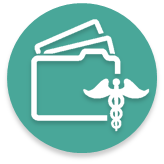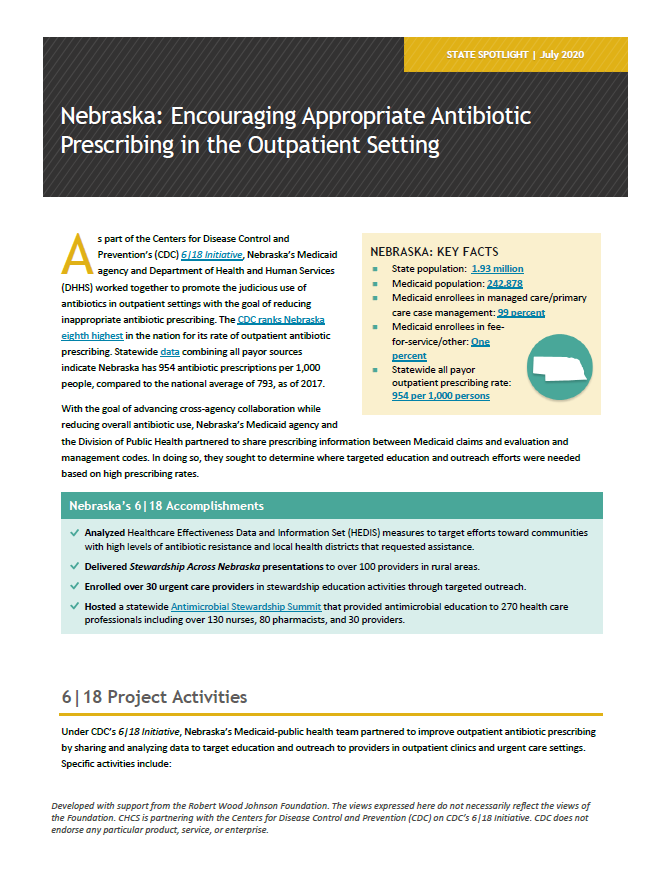Nebraska: Encouraging Appropriate Antibiotic Prescribing in the Outpatient Setting
July 2020 | 6|18 Initiative State Spotlight
As part of the Centers for Disease Control and Prevention’s (CDC) 6|18 Initiative, Nebraska’s Medicaid agency and Department of Health and Human Services (DHHS) worked together to promote the judicious use of antibiotics in outpatient settings with the goal of reducing inappropriate antibiotic prescribing. The CDC ranks Nebraska eighth highest in the nation for its rate of outpatient antibiotic prescribing. Statewide data combining all payor sources indicate Nebraska has 954 antibiotic prescriptions per 1,000 people, compared to the national average of 793, as of 2017.
With the goal of advancing cross-agency collaboration while reducing overall antibiotic use, Nebraska’s Medicaid agency and the Division of Public Health partnered to share prescribing information between Medicaid claims and evaluation and management codes. In doing so, they sought to determine where targeted education and outreach efforts were needed based on high prescribing rates.
NEBRASKA KEY FACTS
- State population: 1.93 million
- Medicaid population: 242,878
- Medicaid enrollees in managed care/primary care case management: 99 percent
- Medicaid enrollees in fee-for-service/other: One percent
- Statewide all payor outpatient prescribing rate: 954 per 1,000 persons
Nebraska’s 6|18 Accomplishments
- Analyzed Healthcare Effectiveness Data and Information Set (HEDIS) measures to target efforts toward communities with high levels of antibiotic resistance and local health districts that requested assistance.
- Delivered Stewardship Across Nebraska presentations to over 100 providers in rural areas.
- Enrolled over 30 urgent care providers in stewardship education activities through targeted outreach.
- Hosted a statewide Antimicrobial Stewardship Summit that provided antimicrobial education to 270 health care professionals including over 130 nurses, 80 pharmacists, and 30 providers.
6|18 Project Activities
Under CDC’s 6|18 Initiative, Nebraska’s Medicaid-public health team partnered to improve outpatient antibiotic prescribing by sharing and analyzing data to target education and outreach to providers in outpatient clinics and urgent care settings. Specific activities include:
 1. Analyze Outpatient Prescribing Data and Geographic Hot Spots
1. Analyze Outpatient Prescribing Data and Geographic Hot Spots
The Medicaid-public health team collaborated to better understand data on current prescribing rates within the Nebraska Medicaid population. They identified data from the Nebraska Antimicrobial Stewardship Assessment and Promotion Program (ASAP) and HEDIS measures to target high prescribing rates and antibiotic resistance geographic hot spots and opportunities for educational outreach. They also determined that use of the Mitigate Toolkit would help direct stewardship activities and guide provider feedback interventions to increase effective antibiotic stewardship.
 2. Distribute Educational and Promotional Materials
2. Distribute Educational and Promotional Materials
Informed by the analyses of Medicaid and public health data, Nebraska implemented these activities to ensure that high-prescribing providers had access to education on appropriate antibiotic practices:
- Driving Stewardship Across Nebraska. The Medicaid-public health team drove across Nebraska to deliver education on appropriate antibiotic use to over 100 providers in rural areas with high rates of inappropriate prescribing. The Driving Stewardship initiative targeted communities with high rates of antibiotic resistance, C. difficile, and/or antibiotic use. The in-person visits provided the opportunity to meet with leadership at all major health care facilities for facility-specific discussions, CME trainings, and grand rounds with health care providers. Trainings included: Role of Microbiology Lab in Antimicrobial Stewardship; Role of Infection Control; Role of Public Health; Regulatory Requirements for Hospitals, Post-acute and Long-term Care, and Outpatient Stewardship; Role of Nurse and Pharmacist Consultants in Post-acute and Long-Term Care.
- Urgent Care Center Activities. Nebraska identified its urgent care centers as an important component of outpatient antibiotic stewardship. During 2019, Nebraska conducted targeted outreach to providers within urgent care centers via postcard mailings; emails; flyers; and through Urgent Care Association of America channels. This outreach encouraged urgent care center providers to register for a CME-based online training to promote appropriate antibiotic use. The Nebraska 6|18 team enrolled over 30 urgent care center providers into the training.
- Statewide Antimicrobial Stewardship Summit. Nebraska leveraged its cross-agency partnership to inform its annual Antimicrobial Stewardship Summit held in May 2019. Multidisciplinary health care leaders in antimicrobial stewardship and staff were invited to attend and share best practices. The state provided participants with resources to promote appropriate antibiotic use, improve patient outcomes, and prevent antibiotic resistance.
Related Resource
Related Topic
State Spotlights: Medicaid-Public Health Collaboration in CDC’s 6|18 Initiative
This profile is part of a series, developed by the Center for Health Care Strategies and made possible by the Robert Wood Johnson Foundation, that showcases how state Medicaid and public health departments are using the Centers for Disease Control and Prevention’s (CDC) 6|18 Initiative to accelerate the adoption of evidence-based prevention efforts focused on improving health outcomes and controlling health care costs. The CDC’s 6|18 Initiative links proven prevention activities to health coverage and delivery with a focus on six high-burden, high-cost health conditions — tobacco use, high blood pressure, inappropriate antibiotic use, asthma, unintended pregnancies, and diabetes.
